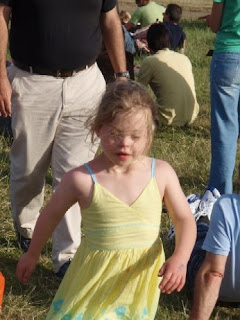I'm going to have to blog about this, because I keep having this debate with other people about the "wicked short selling". I read this morning on the BBC that now the Archbishops of York and Canterbury have weighed in, although they don't seem to know what short selling is.
>
... a speech to bankers by the Archbishop of York, Dr John Sentamu. In it, he called share traders who cashed in on falling prices "bank robbers and asset strippers".
Writing in the Spectator, Archbishop of Canterbury Rowan Williams ... attacks "unbridled capitalism" and defends the socialist theorist Karl Marx's critiques of the system.
He urges that "short-selling" and some other financial practices be banned The BBC article goes on to describe short selling as
"
selling borrowed shares below their current price, betting that prices would fall further"
First of all, the cause of the crisis, and the falling shares, is that banks gave over-optimistic mortgages to people, and underestimated the proportion of those people who'd be unable to pay them back. Short selling has made no contribution to this. What short selling is, is
pointing out that the returns from the mortgages have been over-valued. It's saying, look, these supposed assets that this bank holds, are way over valued. So what the papers are doing, and what the archbishops are backing, is
shooting the messenger who has pointed out the problem.
And it's a violation of free speech. If I think those loans are going to go bad, and that bank shares will have to fall as a result, I should be allowed to say so, and to bet on it. What's the alternative? A law that forces a conspiracy of silence, so the shares remain over-valued? You can't keep it quiet for ever: as borrowers fail to repay, the deficit will become apparent. What's the point of forbidding traders to point it out?
That's all short selling is: observing that the shares are over valued, and betting they'll go down. It is NOT, in essence, about "selling shares below their current price" as the BBC seems to think. Duh! Traders will always sell shares for as much as they can get. They don't sell the shares at a lower price to drive them down... they sell them at a lower price because they want to sell them, and a lower price is
all they can get ... because everybody who's in the market really knows the shares are over-valued! It's just the public that hasn't been informed.
And the thing is, of course, that there are two sides to a trade. So if traders are "short selling", someone else is buying, and agreeing with their estimate of the price. There's actually an exactly equal amount of selling and buying going on! The church and the (leftie) BBC would like to portray it as selling taking place in some sort of vacuum, but it's not just "selling", it's shares changing hands, with an equal amount of selling and buying. The short sellers are basically betting that the shares will go down . . .
and other traders are taking that bet, i.e. betting the opposite. So the activity of the short selling in the marketplace is actually neutral in those terms! The reason the high and mighty don't like it, is that people making
and taking that bet exposes the truth about the value of the banks' assets. That's the sense in which it drives share prices down: by exposing the truth.
The other aspect which people always bring up at this point is that short sellers can sell shares that they don't own yet. This
isn't what causes the problem; it's not cheating, it's not fraudulent, it's well understood, it's a feature of all marketplaces. You can buy things in advance and sell things in advance. What it means, though, is that if they're really confident about their view of the market, they can make a
really big bet. It gears things up, and amplifies the effect of the selling. It enables them to say, "I'm
so sure you've made a mistake with these mortgages, that I'm willing to take a really big position on this". Which, again, embarrasses the banks and makes headline news. I'm sure the government would have liked the banking blunder kept under wraps... which is why they're shushing and bringing in "controls" to stop these wicked traders from revealing the truth.... to us, the public.
It must be so annoying for the Brown and Bush administrations.... couldn't the traders just have kept quiet about all this for a little longer ... kept it under wraps until the after the next elections, when the next lot might well be in power? And then it would be someone elses problem?




























